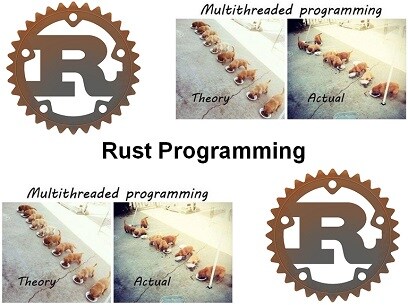-
Learning by doing
-
Trainers with practical experience
-
Classroom training
-
Detailed course material
-
Clear content description
-
Tailormade content possible
-
Training that proceeds
-
Small groups
In the course Rust Programming participants learn to develop software with the latest version of the innovative programming language Rust.
Rust is a new, practical system programming language that produces lightning fast code. Rust is community driven. With Rust you prevent almost all crashes and data races.
Rust builds on a rich history of programming languages. It is low-level language with multiple paradigms, both imperative and functional.
Rust focuses on safe, high-performance, concurrent applications. Rust began to gain momentum in the industry before the official 1.0 version in May 2015, because there is a clear need for a new low-level system language.
This course deals with what makes Rust so unique and applies this to practical problems of system programming. Topics that will be discussed are: traits, generics, memory safety, move semantics, borrowing and lifetimes.
And also the rich macro-system of Rust, closures and concurrency are discussed.
The course Rust Programming is intended for developers who want to learn how to program in Rust and others who want to understand Rust code.
Experience programming in a modern programming language is desirable and beneficial to a good understanding.
The theory is treated on the basis of presentation slides. The concepts are illustrated with demos. The theory is interspersed with exercises. The course times are from 9.30 to 16.30.
The participants receive an official certificate Rust Programming after successful completion of the course.

Module 1 : Rust Intro |
Module 2 : Data Types |
Module 3 : Flow Control |
| What is Rust? Rust Background Rust Momentum Rust Usage Comparisons to C Rust Applications Hello Rust Comments Formatted Printing Debug and Display Literals Operators |
Primitives Tuples and Arrays Slices Custom Types Enums Constants Variable Bindings Scope Shadowing Casting Inference Alias |
Expressions Flow Control if else loop Nesting and labels while for and range match Guards Binding if let while let |
Module 4 : Functions |
Module 5 : Modules |
Module 6 : Generics |
| Methods Closures Capturing As Input Parameters Input Functions Type Anonymity As Output Parameters Examples from std Iterator::any Iterator::find Higher order Functions |
Visibility Struct Visibility use Declaration Using super Using self File Hierarchy Crates Attributes Extern crate Dead Code Custom |
Functions Implementations Parametrization over Types Traits Bounds Multiple Bounds Where Clauses Associated Items Associated Types Phantom Type Parameters Unit Clarification |
Module 7 : Scoping |
Module 8 : Traits |
Module 9 : Standard Library |
| RAII Ownership and Moves Functions and Methods Mutability Borrowing and Freezing Aliasing ref Pattern Lifetimes Explicit Annotation Bounds and Coercion Static Elison |
Zero cost Abstraction Traits are interfaces Derive Operator Overloading Drop Iterators Clone Designators Overload and Repeat Unsafe Operations Static dispatch Dynamic dispatch |
Box, stack, heap Data Structures Vectors Strings Hashmap Threads Channels Path File I/O Pipes Wait Arguments Meta |
